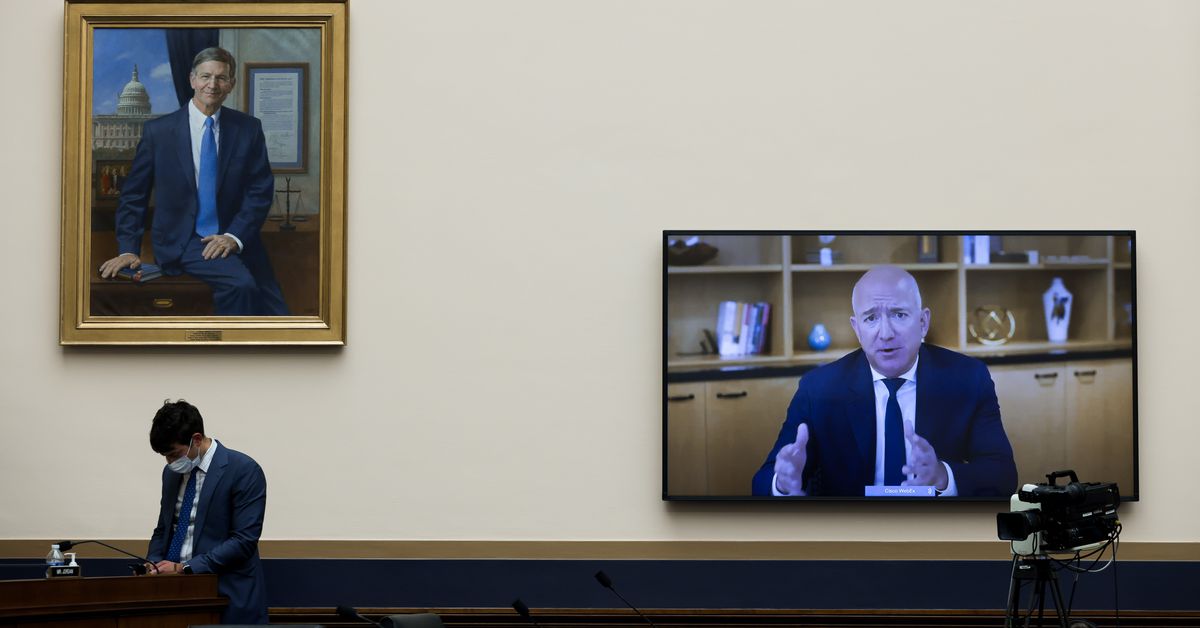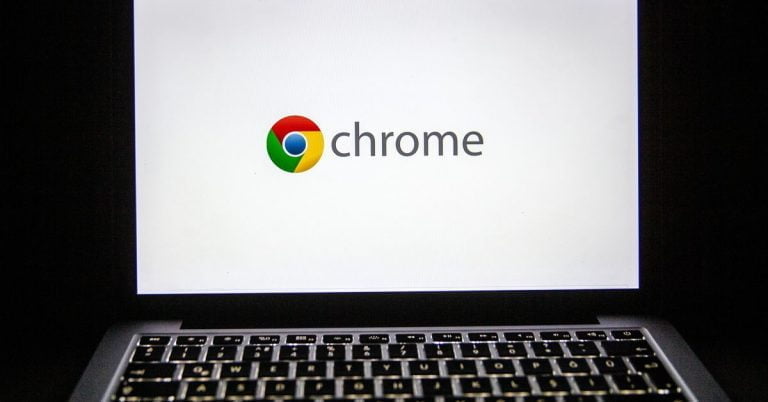
These days, it’s hard to get Democrats and Republicans in Congress to agree on anything.
So it’s notable that Democrats on the Antitrust Subcommittee announced a slew of antitrust legislation today aimed at limiting the power of the tech giants — Amazon, Apple, Facebook, and Google, specifically — with some bipartisan support from their Republican colleagues. Collectively called “A Stronger Online Economy: Opportunity, Innovation, and Choice,” each of the five bills introduced has multiple co-sponsors, including at least one from either side of the aisle.
Broadly, the bills aim at curbing Big Tech’s power by limiting their roles as gatekeepers and their domination of digital markets. The bills also represent the culmination of an 16-month investigation into antitrust issues involving tech companies. If these bills became law, they could significantly contract — or even break up — the key business lines of several major tech companies. They could also change how anti-competitive practices are enforced, whether tech companies can sell or promote their own product on their platforms, and whether they can merge or acquire competing companies at all.
Lobbyist groups for Big Tech have already come out swinging, arguing the bills could jeopardize the economic strength of the American tech sector and inadvertently help competitors in China, as well as limit the ability of tech companies to offer free products to consumers.
On this issue in particular, congressional leaders will likely need even more support from both sides of the aisle if they are going to pass. That’s because the bills will need a wide enough margin in a narrowly Democratic-controlled Senate to pass — meaning they will likely need unilateral or nearly unilateral support from Democrats in addition to Republican support. On a press call on Friday with Democratic and Republican party aides for legislators leading the bills, the group said they anticipate getting more members of Congress to sign on by the end of the day.
Democratic members of the House and Senate have been focusing on how to limit the economic power of major tech companies. And as the Republican co-sponsors on today’s bills show, that desire has some level of support across the aisle.
But other leading Republican senators have been more narrowly focused on a whole other set of issues around perceived anti-conservative bias and limiting tech companies’ power to ban conservative figures.
Subcommittee ranking member Rep. Ken Buck (R-CO), who is an original co-sponsor on all five bills, has said he views antitrust legislation as addressing other Republicans’ concerns, because if there are alternatives to Facebook, Google, and Twitter, then there will be more diverse social media companies representing conservative viewpoints.
“Right now, unregulated tech monopolies have too much power over our economy. They are in a unique position to pick winners and losers, destroy small businesses, raise prices on consumers, and put folks out of work,” subcommittee chairman Rep. David Cicilline (D-RI) said in a statement about the bills. “Our agenda will level the playing field and ensure the wealthiest, most powerful tech monopolies play by the same rules as the rest of us.”
The bills have only just been introduced in the House, and there is a long road ahead before they could ultimately pass. In the meantime, here is a brief overview of the bills and what they mean.
The American Innovation and Choice Online Act
Table of Contents
This bill, introduced by Cicilline and co-sponsored by Rep. Lance Gooden (R-TX), is aimed at tech companies that run “designated platforms,” which regulators would define. It would make it illegal for companies to self-preference their businesses in those marketplaces.
It sets some parameters around what kinds of platforms would be included, and they are significant. Only companies that have 50 million or more monthly US users and $600 billion in market capitalization would be subject to these new regulations, so this would not impact smaller tech platforms. Congressional aides on the press call on Thursday said these bills are really targeted at the biggest and most dominant tech platforms.
This could potentially impact how Apple runs its App Store, or how Amazon deals with its third-party sellers.
The Platform Competition and Opportunity Act
This bill is aimed at making sure that major companies can’t stifle competition by acquiring the upstarts in their industry. It would prohibit “dominant firms from acquiring competitors, potential competitors, and firms or assets that would reinforce their monopoly power.”
Facebook seems like one obvious target of this legislation. The subcommittee’s investigation unveiled how the company has employed a “copy, kill, acquire” strategy toward competitors like Instagram. The bill could also impact the other major tech giants like Google that are well known for acquiring their competition.
The bill is sponsored by Rep. Hakeem Jeffries (D-NY) and co-sponsored by ranking member Buck, the Colorado Republican.
The Ending Platform Monopolies Act
This bill would make it illegal for a “dominant online platform” to own another line of business that is a conflict of interest. It would do this by “removing the ability and incentives of a dominant platform to use its control over multiple business lines to preference itself and disadvantage competitors.”
Introduced by Rep. Pramila Jayapal (D-WA), a frequent critic of Amazon, the legislation could potentially break up the business of the e-commerce giant. It would do this by striking down how Amazon sells its own Amazon-created products on its website. But more broadly, it could impact all the tech giants.
The bill is co-sponsored by Rep. Lance Gooden (R-TX).
The Augmenting Compatibility and Competition by Enabling Service Switching Act
The Augmenting Compatibility and Competition by Enabling Service Switching (ACCESS) Act will require platforms to make user data — defined as any information the platform collects that is linked to a specific person or their device — portable and interoperable with other services.
The logic behind this bill is that once people start using one platform, they won’t move to a competitor because it would be too hard or impossible to move their data over, too. The comparison made here is how switching to a different cellphone carrier used to mean giving up your phone number, too, which discouraged people from doing so. Platforms would have to keep users by providing the best services, rather than by making it hard to leave.
Perhaps in the hope of showing lawmakers that this bill isn’t necessary, several Big Tech companies have voluntarily introduced ways for users to download or transfer their data to other platforms. Facebook, for instance, makes it easy to move your photos and videos to other services, like Google Photos. Obviously, lawmakers didn’t think that was good enough.
The Federal Trade Commission will be charged with establishing interoperability standards to ensure that porting data is possible and will have sufficient privacy protections.
Rep. Mary Gay Scanlon (D-PA) introduced the bill, which will be co-sponsored by Rep. Burgess Owens (R-UT). It could get some bipartisan support in the Senate, too, as a version of it with the same name was introduced last Congress by the bipartisan team of Sens. Richard Blumenthal (D-CT), Josh Hawley (R-MO), and Mark Warner (D-VA).
The Merger Filing Fee Modernization Act
This bill is meant to provide more funds to the agencies charged with investigating and enforcing antitrust issues — specifically, the FTC and the DOJ — by appropriating hundreds of millions of dollars to those agencies and by raising the fees large companies have to pay when they request approval to merge. This would be the first merger filing fee change since 2001, and it’s estimated that it will bring in an additional $135 million in revenue in the first year alone.
But not every company will see an increase in filing fees. The bill actually reduces fees for smaller proposed mergers while increasing them for larger mergers — like the one between Facebook and Instagram, for example — up to $2.25 million. Currently, the highest filing fee is $280,000. The fees will increase with inflation.
The Merger Filing Fee Modernization Act was introduced by Rep. Joe Neguse (D-CO) and co-sponsored by Rep. Victoria Spartz (R-IN). It’s a companion to the identically named bipartisan bill introduced in the Senate last February by Sens. Chuck Grassley (R-IA) and Amy Klobuchar (D-MN), so there’s bicameral and bipartisan support here.






